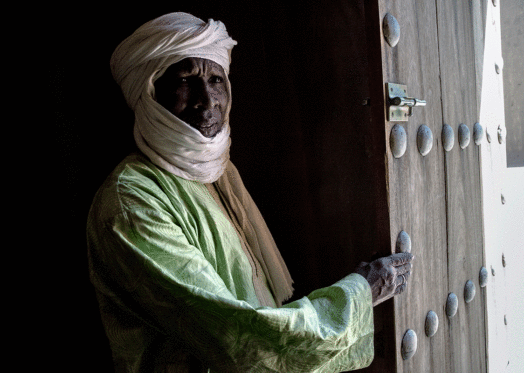Timbuctu

It’s an odd feeling being the lonely guest at the Hotel Colombe and the only toubab in town. I must stay indoor at night, move around face-covered with a scarf, low profile, watching my back: “white spotting” is the first step in the business of kidnapping foreigners. Five years after the French chased the jihadis out of Timbuktu, armed groups still roam the countryside, ambush humanitarian convoys, attack military bases and vanish into the vast Sahara-land. Definitely they have spies and supporters in the city.
So, as I slip past the great Djingereber mosque to the house where the explorer Gordon Laing took shelter in 1826, I can’y help but walking in his shoes…He was also pretending not to be a stranger, dressed like an arab and was looking for ancient manuscripts. He wasn’t lucky. On his way out, he desappeared in the desert halfway to Araouane, betrayed and killed by his servants.
Last time I was here, back in 1992, the Tuareg rebellion had started. I had entered Mali undercover from Mauritania and sailed the Sahara a thousand miles northeast to reach a rebel stronghold where I was half-kidnapped (well…invited to stay), then taken with my companion somewhere by the bend of the Niger: we were given two camels with a Bellah slave to guide us through the dunes and past the army positions into Timbuktu’s outskirts. We parked the camels in front of the five stars Azalai hotel (a jihadis’s den during the occupation) and took our longest shower.
The city looks the same. Dusty streets, sand piling onto the crumbling walls, centuries-old clay minarets under the cloudless sky, blowing winds, hot middays and freezing starry nights; the call to the sunset prayer, the distant bleating of the sheep, the glare of charcoal braziers in the dark, then the flash of a motorbike, young men glued to the smartphones, an infatuated imam preaches on the radio and a couple of frightful tuaregs advance on the dirt road in the majestic blue robe of the desert warriors.
But there are armoured vehicles now at the crossroads and no music from behind the doors. I see empty homes, buildings shattered by the fighting, closed shops and little on sale in the market. It’s not a ghost town: people are slowly trickling back. But after the 2012 jihadi takover half the population fled: depression, fear and suspicion still hang in the air.
I am advised to avoid the arab district on the edge of town, near the tomb of the venered qadi Sidi Mahmud, one of the many monuments destroyed in the name of Allah. Unesco, several governments and private foundations are restoring the damaged libraries and soon the white horse of the jinn al-Farouk, the city’s magical guardian, will return on his concrete round base in Place de l’Indépendance. But insecurity, lack of transports and shortage of food are taking a heavy toll. Malnourished children struggle for their life. And in the run-down wards of the under-staffed hospital and in the shabby health centers, doctors and nurses must cope with decrepit facilities, drugs’ scarcity and erratic budgets.
At sunset I walk the sandy alleys, hunted by memories. Barefoot kids play around, an old marabut sits by the mosque, young women in colorful clothes drift in the twilight. There was a time, decades ago, when this region was a traveler’s dream. I’ve crossed the Sahara four times: on trucks loaded with sheep, on battered Land Rovers, hitchiking, sleeping under the moon, drinking well-water from leather ghirbas, sipping tea in Tuaregs’ tents, baking bread under the fireplace, watching the sunrise from the top of a dune. It’s all long gone.
On my last day I dared a UN kidnap alert and went down to the river in a car: half an hour drive on a bumpy track past the airport and the military base, into the dry bed of a Lybian-built canal, then out in the open desert till I reach a riverside cluster of mud dwellings. The water is exceptionally low, fields are parched by the drought, the cattle is skinny, the fish hard to catch. Here is where more than a thousand displaced people took shelter a month ago when armed Tuaregs raided their village and sized their homes and belongings. They hastily crossed the river on overcrowded pirogues by night and now live in plastic-covered mat shacks with no toilets, scant food, hundreds of children and no hope to go back.





